 W
WJewish partisans were fighters in irregular military groups participating in the Jewish resistance movement against Nazi Germany and its collaborators during World War II.
 W
WNakam was a group of about fifty Holocaust survivors who, in 1945, sought to kill Germans and Nazis in revenge for the murder of six million Jews during the Holocaust. Led by Abba Kovner, the group sought to kill six million Germans in a form of indiscriminate revenge, "a nation for a nation". Kovner went to Mandatory Palestine in order to secure large quantities of poison for poisoning water mains to kill large numbers of Germans, and his followers infiltrated the water system of Nuremberg. However, Kovner was arrested by the British on his return to Europe and had to throw the poison overboard.
 W
WThe Parczew partisans were fighters in irregular military groups participating in the Jewish resistance movement against Nazi Germany and its collaborators during World War II. The name of the partisan force, coined by the Holocaust historians, is borrowed from the Parczew forest located a short distance away from Lublin, halfway to the town of Sobibór, the location of the Sobibór extermination camp during the Holocaust in occupied Poland. The Jews who managed to escape from the camp hid in there along with the considerable number of Jewish families of the Lublin Ghetto.
 W
WYitzhak Arad, is an Israeli historian, author, retired IDF brigadier general and a former Soviet partisan, director of Yad Vashem from 1972 to 1993. He specialised in the history of the Holocaust.
 W
WStanisław Witold Aronson is a Polish Jew and an Israeli citizen, as well as a former officer of the Polish Home Army (AK) with a rank of Lieutenant Colonel. He was also a member of the Kedyw unit, "Kolegium A", of the Warsaw Region of AK, a participant in the Warsaw Uprising of 1944, and a Lieutenant Colonel of the Israeli Defense Force who took part in the 1947–1949 Palestine war, the Yom Kippur War and the 1982 Lebanon War.
 W
WArieh Atzmoni was an Israeli soldier rewarded with the Hero of Israel.
 W
WThe Bielski partisans were a unit of Jewish partisans who rescued Jews from extermination and fought the German occupiers and their collaborators around Nowogródek (Navahrudak) and Lida in German-occupied Poland. The partisan unit was named after the Bielskis, a family of Polish Jews who organized and led the organization.
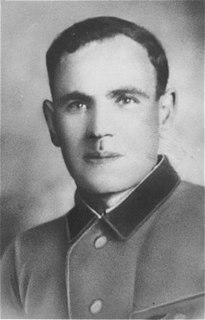 W
WAlexander Zeisal "Zus" Bielski was a leader of the Bielski partisans who rescued approximately 1,200 Jews from Nazi execution in Belarus during World War II.
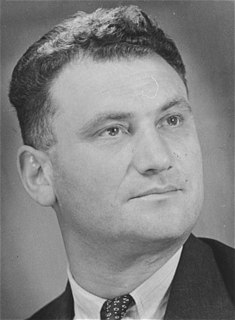 W
WTuvia Bielski was the leader of the Bielski group, Jewish partisans who set up a camp for Jews fleeing the Holocaust during World War II. Their camp was situated in the Naliboki forest, which was part of Poland between World War I and World War II, and which is now in western Belarus.
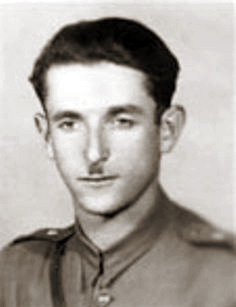 W
WFrank Blaichman, also known as Ephraim Blaichman, occasionally spelled Frank Bleichman, and in Polish Franek or Franciszek Blajchman, was a Polish-Jewish leader of a communist armed organization during World War II and a Holocaust survivor. In post-war communist Poland, Blaichman was the head of the Prison and Camps Department at the Security Office in Kielce. Shortly after the war he emigrated to the United States.
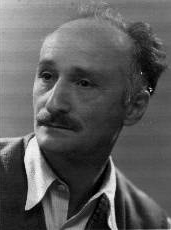 W
WAlexander Bogen was a Polish-Israeli visual artist, a decorated leader of partisans during World War II, a key player in 20th century Yiddish culture, and one of the trailblazers for art education and Artists' associations in the emerging state of Israel.
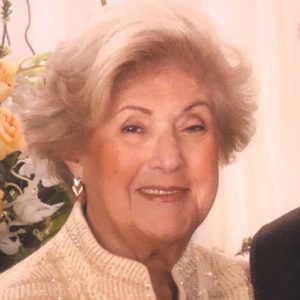 W
WHilda Eisen was a Polish-American businessperson, philanthropist, and Holocaust survivor.
 W
WThe Fareynikte Partizaner Organizatsye was a Jewish resistance organization based in the Vilna Ghetto that organized armed resistance against the Nazis during World War II. The clandestine organisation was established by Communist and Zionist partisans. Their leaders were writer Abba Kovner, Josef Glazman and Yitzhak Wittenberg.
 W
WAlessandro Fersen was a Polish-born Italian dramatist, actor, theater director, author and drama teacher.
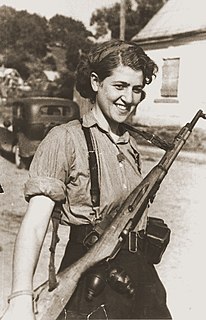 W
WSara Ginaite-Rubinson was a Jewish Lithuanian-born Canadian author and academic. During the Second World War she was a resistance fighter during the Nazi occupation of Lithuania, becoming a Jewish partisan in 1942.
 W
WHirsch Glick was a Jewish poet and partisan.
 W
WHaika Grossman was an Israeli politician and member of Knesset. In her youth, she was a Zionist leader in Europe, a partisan, and a participant in the ghetto uprisings in Poland and Lithuania.
 W
WJoseph Harmatz was a Lithuanian-born Jew who fought as a partisan fighter during World War II. After the war, he joined Nakam and plotted acts of revenge that were aimed at killing Nazis to avenge Jewish deaths during the Holocaust. After emigrating to Israel, he headed World ORT, a Jewish non-profit organization that promotes education and training in communities around the world.
 W
WShmaryahu "Shmerke" Kaczerginski was a Yiddish-speaking poet, musician, writer and cultural activist. Born to a poor family in Vilna and orphaned at a young age, Kaczerginski was educated at the local Talmud Torah and night school, where he became involved in communist politics and was regularly beaten or imprisoned.
 W
WVitka Kempner was a Polish Jewish partisan leader during World War II. She served in the United Partisan Organization and, alongside Rozka Korczak and founder Abba Kovner, assumed a leadership role in its successor group, the Avengers (Nokmim).
 W
WRozka or Ruzka Korczak was a Polish Jewish partisan leader during World War II. She served in the United Partisan Organization and, alongside Vitka Kempner and founder Abba Kovner, assumed a leadership role in its successor group, the Avengers (Nokmim)--the only known undefeated ghetto uprising in the history of the Holocaust.
 W
WAbba Kovner was a Jewish Hebrew and Yiddish poet, writer and partisan leader. In the Vilna Ghetto, his manifesto was the first time that a target of the Holocaust identified the German plan to murder all Jews. His attempt to organize a ghetto uprising failed, but he fled into the forest, became a Soviet partisan, and survived the war. After the war, Kovner led a secretive organization that aimed to take revenge for the Holocaust by killing six million Germans, but he was arrested by the British before he could carry out his plan. He made aliyah in 1947. Considered one of the greatest poets of modern Israel, he received the Israel Prize in 1970.
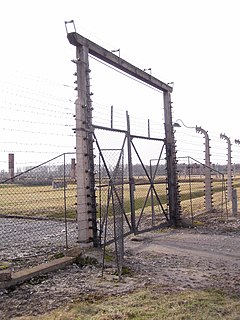 W
WOn the night of 5 April 1944, Siegfried Lederer, a Czech Jew, escaped from the Auschwitz concentration camp wearing an SS uniform provided by SS-Rottenführer Viktor Pestek. Because of his Catholic faith and infatuation with Renée Neumann, a Jewish prisoner, Pestek opposed the Holocaust. He accompanied Lederer out of the camp, and the two men traveled together to the Protectorate of Bohemia and Moravia to obtain false documents for Neumann and her mother.
 W
WMiles Lerman was an American activist who helped plan and create both the United States Holocaust Memorial Museum in Washington, D.C., and the memorial at the Bełżec extermination camp. Lerman, a Holocaust survivor himself, had fought as a Jewish resistance fighter during World War II in Nazi German occupied Poland.
 W
WPrimo Michele Levi was an Italian Jewish chemist, partisan, Holocaust survivor and writer. He was the author of several books, novels, collections of short stories, essays, and poems. His best-known works include If This Is a Man, his account of the year he spent as a prisoner in the Auschwitz concentration camp in Nazi-occupied Poland; and The Periodic Table (1975), linked to qualities of the elements, which the Royal Institution named the best science book ever written.
 W
WŁachwa Ghetto was a Nazi ghetto in Western Belarus during World War II. Located in Lakhva, Belarus), the ghetto was created with the aim of persecution and exploitation of the local Jews. The ghetto existed until September 1942. It was the location of one of the first Jewish ghetto uprisings.
 W
WSonia Shainwald Orbuch was an American Holocaust educator. During the Second World War she was a Jewish resistance fighter in eastern Poland.
 W
WAlexander 'Sasha' Pechersky was one of the organizers, and the leader, of the most successful uprising and mass-escape of Jews from a Nazi extermination camp during World War II; which occurred at the Sobibor extermination camp on 14 October 1943.
 W
WBouena Sarfatty, married name Bouena Sarfatty Garfinkle was a Jewish Greek World War II partisan, a writer of verse, and a renowned needleworker.
 W
WJoseph (Yozhik) Serchuk born Józef Serczuk or Josef Sierczuk was the leader of a Jewish partisan unit in the Lublin area of occupied Poland during the Holocaust. After World War II, he testified at trials of the Nazis, and received special recognition from the State of Israel.